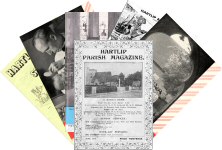
Hartlip Parish Magazine - on-line archive
September 1934 : page 2 (of 2)
VICAR'S LETTER.
My dear People,
The Autumn is near and hop-picking will soon begin, and when that finishes some of you will feel you have some leisure time again. So our various meetings will start, and we look forward to some happy gathering together.
All of us have felt pleasure in congratulating Colonel and Mrs. Locke on becoming proud Grandparents, and our good wishes go out to Mrs. Hope and her little daughter, who in the well-known phrase, "are both doing well."
We shall miss Mrs. Webb from the Parsonage, but trust she may have a beneficial holiday in Gibraltar and return to reside amongst us again.
A horrid brown fungus disease is attacking the snap-dragons or antirrhinums in the South of England. We have it badly in Hartlip. The. Horticultural Society experts at Kew say they know no cure for it. They advise pulling up the plants and burning everyone and disinfecting the soil by fumigation, if possible, and say powdered naphthaline is good for digging into the soil. So far this disease does not seem to attack other flowers. It will be a great loss to our gardens if we find we cannot grow the homely bright snap-dragon, which flowers so freely and is so easy of cultivation.
Your sincerely,
CECIL G. MUTTER.
PATRONAL AND HARVEST FESTIVALS.
These will be held on Friday, September 28th, and the following Sunday.
Gifts of flowers, corn, vegetables, produce, and fruit should he brought to Church on the Friday morning by 11 o'clock.
SERVICES:-
Friday - 1st Evensong of St. Michael, at 7.30 p.m., with Sermon.
Saturday - ST. MICHAEL'S DAY. H.C. at 10 a.m.
Sunday - H.C. at 7, 8, and at 11 a.m. Children's Service and offering of eggs at 3 p.m. Evensong at 6.30 p.m.
Special preachers will be announced.
The alms will be for St. Bartholomew's Hospital Rochester, and the gifts in kind for the Keycol Hill Hospital.
WOMEN'S FELLOWSHIP.
Mrs. Noble will start the meetings again on Thursday, October 4th. New members will be welcomed, and the Winter Programme discussed.
CHURCHYARDS.
The care of Churchyards was some years ago vested in the Parochial Church Council, where formerly it was solely under the Vicar's charge. Parishioners have a right of burial in them, but no one else without special permission. No-one has a claim to to a grave by Law, except those who have purchased a faculty for a plot. This must be done through the Chancellor of the Diocese. As the Law stands, even tombstones erected may be removed unless a faculty for their erection was obtained, and this is a costly proceeding.
The burying of a body gives no claim whatsoever to a grave plot, and no-one can legally object to another interment where a grave space permits this, the erection of a headstone or kerb gives no legal right at all.
But in Hartlip we endeavour to meet the wishes of our parishioners, as far as possible, and in the cases of married people reserve a place so that husband and wife may lie in the same grave, and we are glad to see suitable tombstones placed to mark the dear ones' resting place.
Hartlip Churchyard was closed for burials some time ago, except for a few cases, and then the Vicar gave a free gift of his land to enlarge the burying ground, the parishioners raising money to supply a new boundary wall and fencing. This piece of additional land will last, according to the present average of burials about sixty years. The Parochial Church Council, therefore, have to carefully guard the rights of parishioners, not only now, but for future years. If non-parishioners are interred here because of family connections, all fees are doubled. It is not a question of the Vicar or Church Council's wishes, it is a legal matter and the Church Officers are bound by it.
When jusople wish to erect a stone they should first consult the Vicar and not go to the monumental mason first. It puts the Vicar in an unpleasant position if he is driven to object to something which he feels may be unsuitable. A Diocesan printed card on this matter hangs in the porch and should be read by people before taking any action. Your Vicar is urged by the authorities, for instance, to discourage the placing of foreign marble in the Churchyard. Monumental masons like to supply it because they get a big profit from the ready-made stones quarried in Italy. They only put the lettering on. We should support home industries.
Glaring white stones do not harmonise with the colour of the old church. The marble is not lasting, and when neglected, as they generally are after some years ars have gone by, they have no beauty except the toning down which kindly nature affords. The Vicar does not act arbitrarily, but is governed by the Diocesan experts, who are artists and have deeply studied what is suitable and best. Our wish should be to make our Churchyard as beautiful and restful to the eye as is most possible.
MARRIAGE.
Aug. 22nd - Basil Claude Chambers to Eileen Jane Scott.